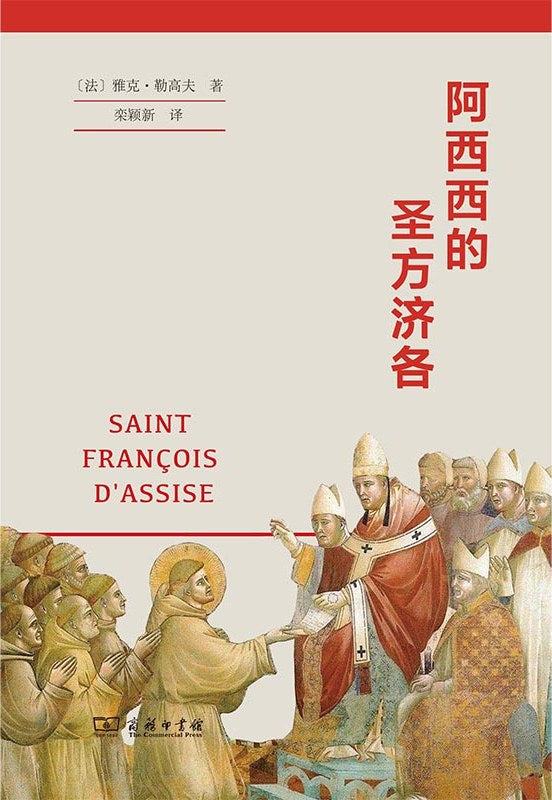WULOLIFE
《阿西西的圣方济各》作者: 雅克·勒高夫 出版社: 商务印书馆 原作名: Saint Francis of Assisi
《阿西西的圣方济各》作者: 雅克·勒高夫 出版社: 商务印书馆 原作名: Saint Francis of Assisi
Couldn't load pickup availability
Description
内容简介 · · · · · ·
“在他身上既能看见诗意,也能看见真相。”
年鉴学派巨擘雅克·勒高夫“反传记”力作
简体中文首译
知名学者彭小瑜、周莽、李文丹推荐
“我们对于新时代有着种种疑问,我希望今天的人们能在本书中听到方济各和他的兄弟们的言语和行动所产生的回响。”——雅克·勒高夫
-------- ---------------------------------------------
方济各(Francesco of Assisi,1181/1182—1226)是从12世纪转向到13世纪的历史时期中的关键人物。他推动了当时的宗教、文明中世纪的诞生。方济各将朴素与威望、谦卑与积极、平凡的身体与非凡的影响力结合起来,满时代大部分人的期望。他在城市中活动,给城市带来了和平,而主张利用金融和市场进行慈善事业。他还呼吁平等,给妇女和儿童以应有的地位。方济各比任何人都更能激发历史学家的研究欲望,也使他在过去和现在都被视为典范人物。
《阿西西的圣方济各》是法国著名历史学家雅克·勒高夫关于方济各的一部力作。虽然书名只涉及方济各,这本书讨论的却不仅仅是方济各,而是从12世纪到1 3世纪的整个中世纪的状况的缩影。此书并非传统的充满奇闻逸事的人物传记,勒高夫力图在研究方法和理解视角上进行创新——把方济各视为整体史的研究对象.
这本书可以算是历史学专著,也可以算是大众读物,它介于两者之间。勒高夫的引导式写法有助于读者在读罢此书之后真正地收获关于中世纪历史的知识,也如勒高夫所言,贫困是人类社会始终要面对的问题,方济各的精神和言行或许对我们仍有启发。
----------------------------------------------------
专家推荐:
彭小瑜(北京大学历史学系教授)
“金钱的用处还不如尘土。”这是方济各关于钱财的著名格言。但是他本人以及方济各会并不排斥市场经济。他只是以他自己的以及同道的少数精英生活来批评物欲横流的贪婪社会。方济各以及方济各会的修士们强调了货币和市场正面的社会作用,注重利用金融和市场来做慈善事业.
也是工业革命以后的现代西方社会需要的价值观念。人与人之间的敌意和不平等所以今天的世界需要特别珍惜方济各的思想和事迹所提供的榜样和价值观。
周莽(北京大学外国语学院法语系副教授)
《阿西西的圣方济各》与《圣路易》是挑战之作,既然大家都说年鉴派的长勒高夫偏要试一试,证明本无局限。《阿西西的圣方济各》是挺奇特的书,是几篇论文和素材合成的,貌Paupertas cum laetitia,传记材料并非越多越好。方济各是熟题材,有众多的书面与口头的传说,圣徒本身就是世俗信仰的对象,但是他身上的历史又在哪里?要考虑推陈出新,而且去除那些激动人心的传说,尽量还原方济各本人,这更加是他的作为也是在俗世里,努力解决新美乐与仁爱问题,注重从感性来解决建立信众共同体的问题。多杂未必真切。如书尾所言,贫困始终是人类托钵僧运动或许仍对我们有启发。
李文丹(北京大学历史学系助理教授)
以任何标准,方济各都是中世纪欧洲十分重要、迷人的历史人物。他以穷人和小兄弟自称,放弃一切财产。他向苏丹传教,也向鸟群布道。他被誉为文艺复兴与现代精神的开创者。
年鉴学派巨擘雅克·勒高夫举重若轻,高屋建瓴,从历史背景、个人生平、阶层话语、文化模式四方面,勾画出圣方济各的血肉、心灵与影响。本书为论文集结,不求大求全,却是作者三十余年的学术思考与人生体悟。它体现了勒高夫通过传记研究“整体史”的方法,展示了托钵修会史如何被纳入城市史、社会史的新问题域,Chinese:
译者栾颖新是中世纪史研究的优秀新锐,在法国接受系统学术训练。中译本序与译后记为本书提供了绝佳的导读。
